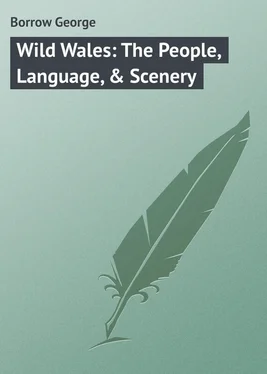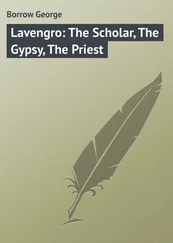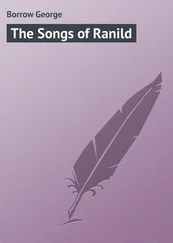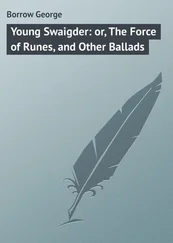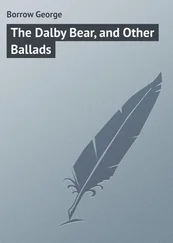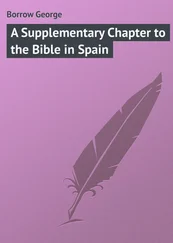George Borrow - Wild Wales - The People, Language, & Scenery
Здесь есть возможность читать онлайн «George Borrow - Wild Wales - The People, Language, & Scenery» — ознакомительный отрывок электронной книги совершенно бесплатно, а после прочтения отрывка купить полную версию. В некоторых случаях можно слушать аудио, скачать через торрент в формате fb2 и присутствует краткое содержание. Жанр: foreign_prose, Путешествия и география, на английском языке. Описание произведения, (предисловие) а так же отзывы посетителей доступны на портале библиотеки ЛибКат.
- Название:Wild Wales: The People, Language, & Scenery
- Автор:
- Жанр:
- Год:неизвестен
- ISBN:нет данных
- Рейтинг книги:5 / 5. Голосов: 1
-
Избранное:Добавить в избранное
- Отзывы:
-
Ваша оценка:
- 100
- 1
- 2
- 3
- 4
- 5
Wild Wales: The People, Language, & Scenery: краткое содержание, описание и аннотация
Предлагаем к чтению аннотацию, описание, краткое содержание или предисловие (зависит от того, что написал сам автор книги «Wild Wales: The People, Language, & Scenery»). Если вы не нашли необходимую информацию о книге — напишите в комментариях, мы постараемся отыскать её.
Wild Wales: The People, Language, & Scenery — читать онлайн ознакомительный отрывок
Ниже представлен текст книги, разбитый по страницам. Система сохранения места последней прочитанной страницы, позволяет с удобством читать онлайн бесплатно книгу «Wild Wales: The People, Language, & Scenery», без необходимости каждый раз заново искать на чём Вы остановились. Поставьте закладку, и сможете в любой момент перейти на страницу, на которой закончили чтение.
Интервал:
Закладка:
“Hardly more than yourself,” said I. “Come; I shall be glad to go. What I said about the Gwyddelians was only in jest.”
As we were about to depart John said,
“It does not rain at present, sir, but I think it will. You had better take an umbrella.”
I did so, and away we went. We passed over the bridge, and turning to the right went by the back of the town through a field. As we passed by the Plas Newydd John Jones said:
“No one lives there now, sir; all dark and dreary; very different from the state of things when the ladies lived there – all gay then and cheerful. I remember the ladies, sir, particularly the last, who lived by herself after her companion died. She was a good lady, and very kind to the poor; when they came to her gate they were never sent away without something to cheer them. She was a grand lady too – kept grand company, and used to be drawn about in a coach by four horses. But she too is gone, and the house is cold and empty; no fire in it, sir; no furniture. There was an auction after her death; and a grand auction it was and lasted four days. O, what a throng of people there was, some of whom came from a great distance, to buy the curious things, of which there were plenty.”
We passed over a bridge, which crosses a torrent, which descends from the mountain on the south side of Llangollen, which bridge John Jones told me was called the bridge of the Melin Bac, or mill of the nook, from a mill of that name close by. Continuing our way we came to a glen, down which the torrent comes which passes under the bridge. There was little water in the bed of the torrent, and we crossed easily enough by stepping-stones. I looked up the glen; a wild place enough, its sides overgrown with trees. Dreary and dismal it looked in the gloom of the closing evening. John Jones said that there was no regular path up it, and that one could only get along by jumping from stone to stone, at the hazard of breaking one’s legs. Having passed over the bed of the torrent, we came to a path, which led up the mountain. The path was very steep and stony; the glen with its trees and darkness on our right. We proceeded some way. At length John Jones pointed to a hollow lane on our right, seemingly leading into the glen.
“That place, sir,” said he, “is called Pant y Gwyddel – the Irishman’s dingle, and sometimes Pant Paddy, from the Irish being fond of taking up their quarters there. It was just here, at the entrance of the pant, that the tribe were encamped, when I passed two months ago at night, in returning from the other side of the hill with ten shillings in my pocket, which I had been paid for a piece of my work, which I had carried over the mountain to the very place where I am now carrying this. I shall never forget the fright I was in, both on account of my life, and my ten shillings. I ran down what remained of the hill as fast as I could, not minding the stones. Should I meet a tribe now on my return I shall not run; you will be with me, and I shall not fear for my life nor for my money, which will be now more than ten shillings, provided the man over the hill pays me, as I have no doubt he will.”
As we ascended higher we gradually diverged from the glen, though we did not lose sight of it till we reached the top of the mountain. The top was nearly level. On our right were a few fields enclosed with stone walls. On our left was an open space where whin, furze and heath were growing. We passed over the summit, and began to descend by a tolerably good, though steep road. But for the darkness of evening and a drizzling mist, which, for some time past, had been coming on, we should have enjoyed a glorious prospect down into the valley, or perhaps I should say that I should have enjoyed a glorious prospect, for John Jones, like a true mountaineer, cared not a brass farthing for prospects. Even as it was, noble glimpses of wood and rock were occasionally to be obtained. The mist soon wetted us to the skin, notwithstanding that we put up our umbrellas. It was a regular Welsh mist, a niwl, like that in which the great poet Ab Gwilym lost his way, whilst trying to keep an assignation with his beloved Morfydd, and which he abuses in the following manner: —
“O ho! thou villain mist, O ho!
What plea hast thou to plague me so!
I scarcely know a scurril name,
But dearly thou deserv’st the same;
Thou exhalation from the deep
Unknown, where ugly spirits keep!
Thou smoke from hellish stews uphurl’d
To mock and mortify the world!
Thou spider-web of giant race,
Spun out and spread through airy space!
Avaunt, thou filthy, clammy thing,
Of sorry rain the source and spring!
Moist blanket dripping misery down,
Loathed alike by land and town!
Thou watery monster, wan to see,
Intruding ’twixt the sun and me,
To rob me of my blessed right,
To turn my day to dismal night.
Parent of thieves and patron best,
They brave pursuit within thy breast!
Mostly from thee its merciless snow
Grim January doth glean, I trow.
Pass off with speed, thou prowler pale,
Holding along o’er hill and dale,
Spilling a noxious spittle round,
Spoiling the fairies’ sporting ground!
Move off to hell, mysterious haze;
Wherein deceitful meteors blaze;
Thou wild of vapour, vast, o’ergrown,
Huge as the ocean of unknown.”
As we descended the path became more steep; it was particularly so at a part where it was overshadowed with trees on both sides. Here finding walking very uncomfortable, my knees suffering much, I determined to run. So shouting to John Jones, “Nis gallav gerdded rhaid rhedeg,” I set off running down the pass. My companion followed close behind, and luckily meeting no mischance, we presently found ourselves on level ground, amongst a collection of small houses. On our turning a corner a church appeared on our left hand on the slope of the hill. In the churchyard, and close to the road, grew a large yew-tree which flung its boughs far on every side. John Jones stopping by the tree said, that if I looked over the wall of the yard I should see the tomb of a Lord Dungannon, who had been a great benefactor to the village. I looked, and through the lower branches of the yew, which hung over part of the churchyard, I saw what appeared to be a mausoleum. Jones told me that in the church also there was the tomb of a great person of the name of Tyrwhitt.
We passed on by various houses till we came nearly to the bottom of the valley. Jones then pointing to a large house, at a little distance on the right, told me that it was a good gwesty, and advised me to go and refresh myself in it, whilst he went and carried home his work to the man who employed him, who he said lived in a farm-house a few hundred yards off. I asked him where we were.
“At Llyn Ceiriog,” he replied.
I then asked if we were near Pont Fadog; and received for answer that Pont Fadog was a good way down the valley, to the north-east, and that we could not see it owing to a hill which intervened.
Jones went his way and I proceeded to the gwestfa, the door of which stood invitingly open. I entered a large kitchen, at one end of which a good fire was burning in a grate, in front of which was a long table, and a high settle on either side. Everything looked very comfortable. There was nobody in the kitchen: on my calling, however, a girl came whom I bade in Welsh to bring me a pint of the best ale. The girl stared, but went away apparently to fetch it. Presently came the landlady, a good-looking middle-aged woman. I saluted her in Welsh and then asked her if she could speak English. She replied “Tipyn bach,” which interpreted, is, a little bit. I soon, however, found that she could speak it very passably, for two men coming in from the rear of the house she conversed with them in English. These two individuals seated themselves on chairs near the door, and called for beer. The girl brought in the ale, and I sat down by the fire, poured myself out a glass, and made myself comfortable. Presently a gig drove up to the door, and in came a couple of dogs, one a tall black greyhound, the other a large female setter, the coat of the latter dripping with rain, and shortly after two men from the gig entered, one who appeared to be the principal was a stout bluff-looking person between fifty and sixty dressed in a grey stuff coat and with a slouched hat on his head. This man bustled much about, and in a broad Yorkshire dialect ordered a fire to be lighted in another room, and a chamber to be prepared for him and his companion; the landlady, who appeared to know him, and to treat him with a kind of deference, asked if she should prepare two beds; whereupon he answered “No! As we came together, and shall start together, so shall we sleep together; it will not be for the first time.”
Читать дальшеИнтервал:
Закладка:
Похожие книги на «Wild Wales: The People, Language, & Scenery»
Представляем Вашему вниманию похожие книги на «Wild Wales: The People, Language, & Scenery» списком для выбора. Мы отобрали схожую по названию и смыслу литературу в надежде предоставить читателям больше вариантов отыскать новые, интересные, ещё непрочитанные произведения.
Обсуждение, отзывы о книге «Wild Wales: The People, Language, & Scenery» и просто собственные мнения читателей. Оставьте ваши комментарии, напишите, что Вы думаете о произведении, его смысле или главных героях. Укажите что конкретно понравилось, а что нет, и почему Вы так считаете.
